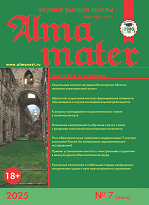Natalya P. Sukhanova, PhD (Philosophy), Docent, Associate Professor, Department of Philosophy and Humanities, Novosibirsk State University of Economics and Management, Russia, eLibrary SPIN-code: 2647-7829, AuthorID: 599434, е-mail: konfngi@yandex.ru
In the context of the rapid development of artificial intelligence, the neural networks became part of the educational process, providing opportunities for personalization of training, processing large data arrays and solving routine problems. In this case, there is a need for philosophical reflection aimed at identifying the deep consequences of the technologicalization of education. Attention is focused on whether the neural networks really change our ideas about knowledge. In the context of the theory of social relayers, the specificity of knowledge generated by neuralities is analyzed. The traditional understanding of knowledge based on experience and creative rethinking is opposed to the algorithmic representation of data from neural networks, devoid of intentionality and metacognitive abilities inherent in a person as a participant in many social programs. The introduction of neural networks in the university education system also gives rise to a series of ethical issues. Neural networks remain an instrument, the use of which can lead to increased utilitarianism in teaching and weakening of students' interest in independent intellectual work. Existing risks of standardization and automation of the educational process, leading to the loss of the unique role of the teacher and a decrease in the significance of the student’s personal experience, are subject to assessment. The preservation of the humanistic measurement of education requires the development of ethical norms that regulate the use of neural networks and ensure the balance between technological resources and educational values.
Keywords: education, neural networks, knowledge, learning, information, philosophy, ethical issues
References
1. Alekseeva, E.A. Is an artificial teacher possible? Tekhnologos. 2020. No. 4. Pp. 40–55. DOI: 10.15593/perm.kipf/2020.4.04
2. Vorobyova, M.V. Application of neural networks in the educational process: examples, possibilities and risks. Pedagogical education and science. 2024. No. 3. Pp. 102–108. DOI: 10.56163/2072-2524-2024-3-102-107
3. Gerashchenko, I.G., Gerashchenko, N.V. Efficiency of using artificial intelligence in higher education: philosophical and anthropological analysis. Science. Society. State. 2024. Vol. 12. No. 1 (45). Pp. 101–109. DOI: 10.21685/2307-9525-2024-12-1-11
4. Gromova, O.B., Gromova, A.V. Prospects for Transforming the Higher Education Model in the Era of Artificial Intelligence. Higher Education Today. 2024. No. 2. Pp. 8–12. DOI: 10.18137/RNU.HET.24.02.P.008
5. Davydova, G.I., Shlykova, N.V. Risks and Challenges in Implementing Artificial Intelligence in the Higher Education System. Vestnik of Practical Psychology of Education. 2024. Vol. 21. No. 3. Pp. 62–69. DOI: 10.17759/bppe.2024210308
6. Zakharov, A.O. Education in the Era of Marginalism: Alienation of Knowledge. Voprosy Filosofii. 2021. No. 12. Pp. 131–137. DOI: 10.21146/0042-8744-2021-12-131-137
7. Knecht, N.P. The Problem of Knowledge and Understanding in the Digital Age. Economic and Social-Humanitarian Studies. 2022. No. 4 (36). Pp. 117–126. DOI: 10.24151/2409-1073-2022-4-117-126
8. Kuzmenko, E.L., Belousova, T.M., Leshchenko, E.M. Problems and risks of integrating artificial intelligence into higher education. Region: systems, economy, management. 2024. No. 2 (65). Pp. 164–168. DOI: 10.22394 / 1997-4469-2024-65-2-164-168
9. Kurbanova, Z.S., Ismailova, N.P. Neural networks in the context of digitalization of education and science. The world of science, culture, education. 2023. No. 3 (100). Pp. 309–311. DOI: 10.24412 / 1991-5497-2023-3100-309-311
10. Lesyuk, M.I. Ethical aspects of neural network technologies in science and education. Artificial societies. 2023. Vol. 18. No. 3. DOI: 10.18254/S207751800027043-6
11. Nikishkina, E.V., Larin, S.E., Belash, V.Yu. Neural networks and education: positive and negative sides, possibilities of use. Pedagogical Vestnik. 2024. No. 32. Pp. 54–58.
12. Polovinko, E.V., Botvineva, N.Yu., Cheboksarov, A.B. Problems of using generative neural networks in modern education. Problems of modern pedagogical education. 2024. No. 82-4. Pp. 327–330.
13. Rozov, M.A. Philosophy of science in a new vision. Moscow: Novyi Khronograf, 2012. 440 p.
14. Romanovskaya, V.B., Romanovskaya, L.R. Neural network and current problems of university education. Bulletin of the Nizhny Novgorod University named after N.I. Lobachevsky. 2024. No. 1. Pp. 125–130. DOI: 10.52452/19931778_2024_1_125
15. Sukhanova, N.P. Focus on critical thinking in an economics university. Alma mater (Vestnik vysshey shkoly). 2025. No. 2. Pp. 54–59. DOI: 10.20339/AM.02-25.054
16. Sychev, A.A. Artificial intelligence as a challenge to the education system: ethical and applied aspects. Bulletin of Applied Ethics. 2024. No. 2 (64). Pp. 74–81.
17. Trusov, N.A. Consequences of Using the Capabilities of Neural Networks in the Educational Process. Technologies of Social and Humanitarian Research. 2024. No. 1 (5). Pp. 126–141.
18. Chernykh, S.I. Generative Artificial Intelligence in Education: Prospects of New Didactics. Philosophy of Education. 2024. Vol. 24. No. 2. Pp. 74–86. DOI: 10.15372/PHE20240205
19. Shayakhmetova, L.A., Kuchumov, V.D. Ethics of Using Neural Networks in the Educational Process. Bulletin of Perm State Humanitarian and Pedagogical University. Series 3. Humanities and Social Sciences. 2024. No. 1. Pp. 109–113. DOI: 10.24412/2308-7196-2024-1-110-114
20. Yulina, N.S. Philosophy for Children. Moscow: “Canon+” ROOI “Rehabilitation”, 2005. 464 p.
21. Koptseva, N.P. Constructivist pedagogy in context of modern philosophy of education. Perspectives of Science and Education. 2020. No. 6 (48). Pp. 40–54. DOI: 10.32744/pse.2020.6.4











.png)






